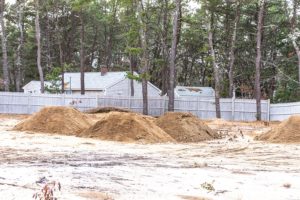WELLFLEET — A dispute over the use of a commercial parcel at the corner of Route 6 and Old Wharf Road has entered a new phase after the owner, Great White Realty Group, secured a permit to create a contractor’s yard there and hang a sign on the property.
But in authorizing the permit in mid-November, interim Building Inspector Victor Staley imposed limitations that have put a major crimp in the land owner’s plans.
Great White intends to lease the property at 1065 Route 6 as a satellite contractor’s yard to GFM Enterprises of South Dennis, an excavating company specializing in septic systems.
As part of its operation, GFM plans to store dump trucks, 10-wheelers, a loader, and skid steers onsite, along with supplies including outdoor containers, piping, precast risers, loam, T-base, and stone.

Under Staley’s reading of the town’s zoning bylaw, GFM can use the lot to park its vehicles or to store other equipment and supplies — but not both. Staley therefore placed a condition on his authorization stating the lot could be used to store GFM’s vehicles but nothing else.
Staley also required Donna and Steve DiGiovanni of Truro, the owners of Great White Realty, to present a plan to the town by Dec. 10 for the abatement of their having stripped the trees and topsoil on a large portion of the property.
Attorney Ben Zehnder of the Orleans firm La Tanzi, Spaulding & Landreth, representing Great White, wrote to Staley a few days after the authorization, saying that “any rational reading” of the town’s definition of a contractor’s yard would allow for the storage of both the vehicles and the supplies and equipment needed for operation of the business.
Using Staley’s narrow interpretation of the town’s zoning laws would mean “a campground could be used by campers but not by tents,” Zehnder said in an email to Staley. “Absent the ability to store equipment and supplies, the use is effectively no more than overnight parking for vehicles, which is not what was presented.”
Zehnder said that Staley’s interpretation “guts the clear intention of the bylaw in describing various activities that make up defined use.”
Staley told the Independent on Monday that he will likely “revisit” the issue, conceding that it is “not logical” for a contractor to be allowed to use the site for vehicles but not for equipment. An issue regarding the bulk storage of materials remained, he said. The town contends such storage requires a special permit.
Zehnder notified the state Land Court on Nov. 18 of his intention to file a motion for summary judgment on “the following questions of law”: whether the tree-cutting and topsoil removal in preparation for use of the property as a contractor’s yard constitutes quarry or gravel pit activity that would require a special permit; whether storing sand, gravel, and soil to be used in septic system installation needs a special permit or can be done as part of the operation of a contractor’s yard; and whether a building inspector has the authority to place conditions on a “by right” use of the property as a contractor’s yard.
The battle over the 1.3-acre site began in January, shortly after Great White Realty Group purchased the heavily wooded lot and quickly cleared three-fourths of the trees, stripped the topsoil, and began grading.
Paul Fowler, who was then the town’s building inspector, issued a cease-and-desist order, saying such substantial clearing required a permit from the building dept.
The work being conducted, Fowler said, constituted a “quarry, sandpit, gravel pit, and soil stripping” operation, which is prohibited in the commercial zone. His cease-and-desist order included a requirement for abatement.
The piles of fill on the site fell under the bylaw covering bulk storage of materials, Fowler said, which requires a special permit from the zoning board of appeals. Screening of loam and topsoil on the property would fall under the definition of “light industry” in the bylaw and would also require a special permit.
Great White appealed Fowler’s order to the zoning board, but the panel upheld the building inspector’s decision regarding the need for special permits. The zoning board then denied requests from Great White Realty for those permits.
In his Nov. 18 filing with the court, Zehnder said his clients had been “diligently seeking approval” since June for a by-right contractor’s yard that would not include any bulk storage of materials. Zehnder included his email exchanges with Staley in his court filing.
Zehnder maintained that the plan included only allowed uses under the bylaw’s definition of a contractor’s yard, with no need for special permits.
On Monday, Staley said Great White had not yet put up a sign at the property and there had been no activity on the site. Dump trucks were seen at the property on Tuesday, however.
The town’s new building inspector, James Badera, was schedued to start work on Dec. 1. Staley said he would stay on as alternate building inspector to help with the department’s backlog of permitting.
